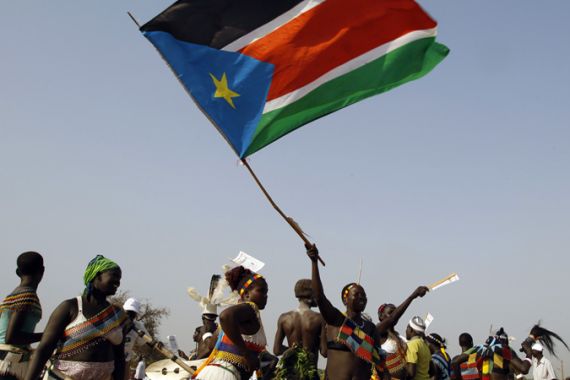Bashir doubts south’s viability
Sudan’s president says the south’s desire for secession is understandable, but warns it will not solve its problems.

Sudan’s president has warned that south Sudan would struggle as an independent nation were it to vote to secede from the north.
Speaking just days before a referendum, which is expected to see southerners vote to establish a separate country, Omar al-Bashir told Al Jazeera that he was concerned about possible instability in the south following the vote.
“The stability of the south is very important to us because any instability in the south will have an impact on the north. If there is a war in your neighbour’s house, you will not be at peace,” he said on Friday.
“The south suffers from many problems. It’s been at war since 1959. The south does not have the ability to provide for its citizens or create a state or authority.”
The referendum is a result of the Comprehensive Peace Agreement (CPA), signed in 2005, that ended near three decades of civil war between north and south Sudan.
Under the terms of the CPA, a quorum of 60 per cent of the 3.8 million voters are required to take part in the referendum for its outcome to become binding, but most believe the south will be in favour of secession.
The mood in Juba, south Sudan’s capital, and elsewhere was jubilant on Friday as the final pro-secession rallies were held with many apparently already celebrating independence.
Southern suffering
Speaking to Al Jazeera, al-Bashir suggested the south’s desire for independence was understandable, but was far from being a cure-all.
“Most southerners are separatists because the south has been at war for a long time and this war has affected every southern citizen in a very negative way,” al-Bashir said.
“It has either caused them to become refugees or be harmed in some way … They believe that the cause of all this suffering is that the south is under the control of the north and they think that they can only end this suffering by separating the north from the south.”
Al-Bashir, who is wanted by the International Criminal Court for alleged war crimes in the Darfur region, has earned rare praise from the United Nations Security Council for his stance on the referendum.
In recent weeks he has several times said he will respect and support the south’s wishes if it chooses independence.
Beyond the referendum, several issues covered in the CPA remain unresolved, including the situation in Darfur, border delineation between the north and south and the division of Sudan’s national debt.
But Thabo Mbeki, the former South African president and the chairperson of the African Union (AU) panel on Sudan, has said he expects these issues to be resolved by the time the CPA expires on July 9.
Returning home
Mbeki made his comments in Juba, the southern capital, on Friday. Also in the south was George Clooney, the Hollywood star, who was due to travel to the disputed region of Abyei.
The oil-rich Abyei region, a sticking point in what is otherwise being viewed as a successful build-up to the landmark vote, had been due to hold a simultaneous vote on its future on Sunday, but that has now been indefinitely postponed.
The delay has prompted fears of clashes between the district’s settled pro-southern Ngok Dinka population and Misseriya Arabs from the north who use its waters for seasonal pasture.
The United Nations’ refugee agency has said that an average of 2,000 southerners are crossing back into south Sudan from the north every day ahead of the January 9-15 vote.
“The number of southerners who are leaving the North ahead of this week’s landmark Sudan referendum to return to their ancestral homes in the South has doubled since mid-December and now stands at 120,000,” the office of the UN High Commissioner for Refugees (UNHCR) said in a statement on Friday.
Some reports say that hundreds more southerners have been stranded south of Khartoum, the northern capital, waiting for transport back to the south.